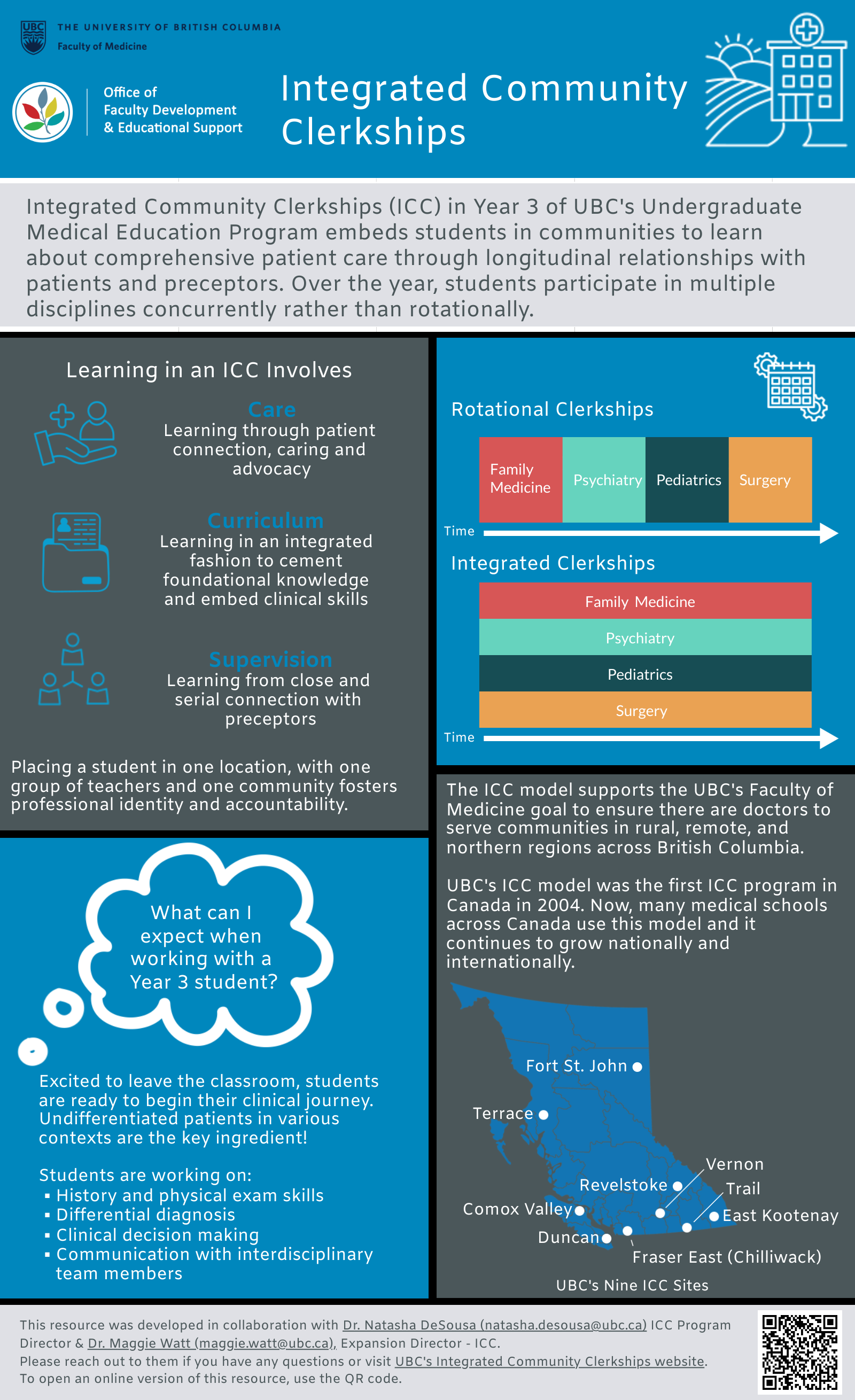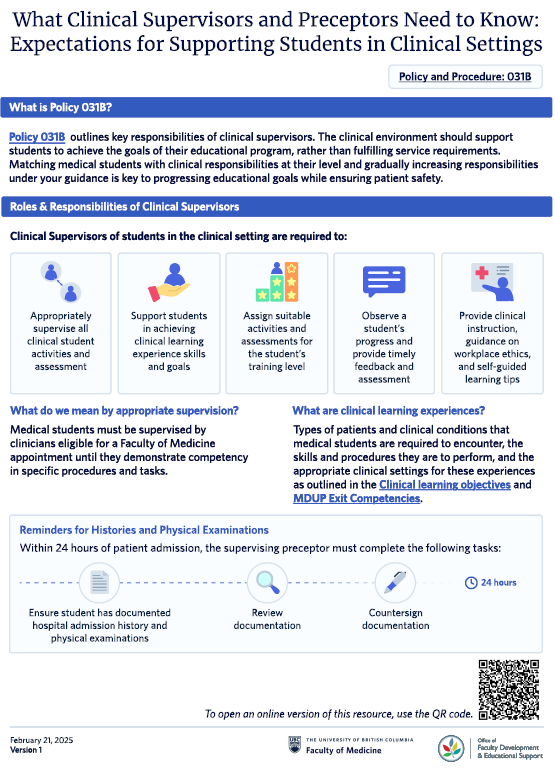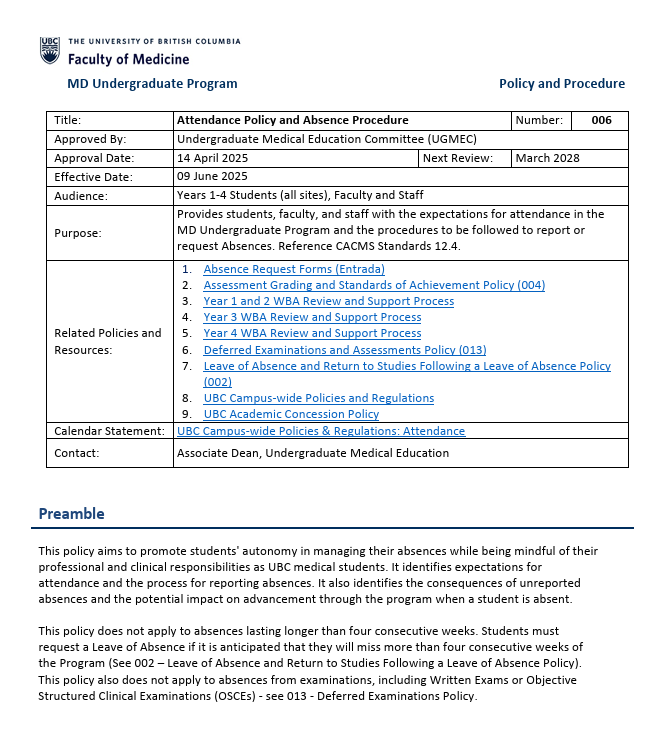Integrated Community Clerkship (ICC & NRIC) Resources
This page contains resources and workshops to support Integrated Community Clerkship (ICC) and Northern Regional Integrated Clerkship (NRIC) faculty in teaching students in Year 3 of UBC’s MD Undergraduate Program (MDUP).
ICC Infographic
This infographic describes Integrated Community Clerkships (ICC) in year 3 of UBC’s UGME.
ICC embeds students in different BC communities to learn about comprehensive patient care through longitudinal relationships with patients and preceptors.
The ICC has become a successful and innovative model of undergraduate clinical education, a model that is endorsed and implemented by medical schools all over the world.
ICC & NRIC Breakfast Club Series
All faculty who teach in ICCs and NRICs are invited to discuss a teaching topic and have seasoned preceptors share their perspectives on how to apply it.
The aim of these sessions is to develop a learning community with a format of 15 minutes of presentation and 45 minutes of discussion so that your perspectives are shared and your questions are answered.
Sessions are accredited. Session recordings and resources are posted below for all past sessions.

The Zoom session link and password will be posted a day prior to the session!
ICC Breakfast Club: AI in Clinical Learning Environments
When: April 21, 2026, 7-8am PST
Where: Online via Zoom
Guest Speaker: Kevin Shi
ICC Breakfast Club: A Year in Review & Perspectives on Layered Learning
When: June 23, 2026, 7-8am PST
Where: Online via Zoom
Facilitators: Johnny Chang, Maggie Watt, Heather Buckley, Sharon Doucet
ICC & NRIC Breakfast Club Past Sessions
Snappy Presentations
Date: February 24, 2026
Speakers: Tara Gill and Sharon Doucet
Session recording to be posted soon!
View the session handout document of ICC Breakfast Club – Snappy Presentations
Bringing People In through Inclusive Language
Date: November 18, 2025
Speaker: Niresha Velmurugiah
View the session recording of ICC Breakfast Club – Bringing People In through Inclusive Language
View the session summary document of ICC Breakfast Club – Bringing People In through Inclusive Language
Layered Learning
Date: February 25th, 2025
Speakers: Maggie Watt, Terri Hopkins, Tom Rimmer
View the session recording of ICC Breakfast Club – Layered Learning
View the session summary document of ICC Breakfast Club – Layered Learning
Student in Difficulty
Date: September 17th, 2024
Speakers: Carmen Larsen, Fiona Manning, Maggie Watts, Clarissa Wallace
View the session summary document of ICC Breakfast Club – Student in Difficulty
Reporter, Investigator, Manager, Educator (RIME)
Date: June 18th, 2024
Speaker: Louis Pangaro, the inventor of RIME
View the session recording of ICC Breakfast Club Series – Reporter, Investigator, Manager Editor (RIME).
View the RIME infographic PDF and microresource
Quick Tips for Teaching
Quick Tips for Teaching
These quick resources are designed to be accessed in the clinic, and completed in just 3-5 minutes. The topics follow the chronological order of how learners progress through an ICC.
Topics:
- Welcoming a Learner
- Creating Goals with your Learner
- Direct Observation
- RIME (Reporter, Interpreter, Manager, Educator)
ICC & NRIC Teaching Resources
Year 3 Assessment & Mandatory Clinical Procedures/Patient Encounters
This page provides a comprehensive list of curriculum and assessment resources for Year 3 and Year 4 Clinical Preceptors including Workplace Based Assessment (WBA) Orientation, Clinical Procedures and Patient Encounters, and samples of End of Rotation (EOR) and End of Elective (EOE) forms.
Explore by clicking here: Years 3 & 4 Resources for Clinical Faculty & Residents
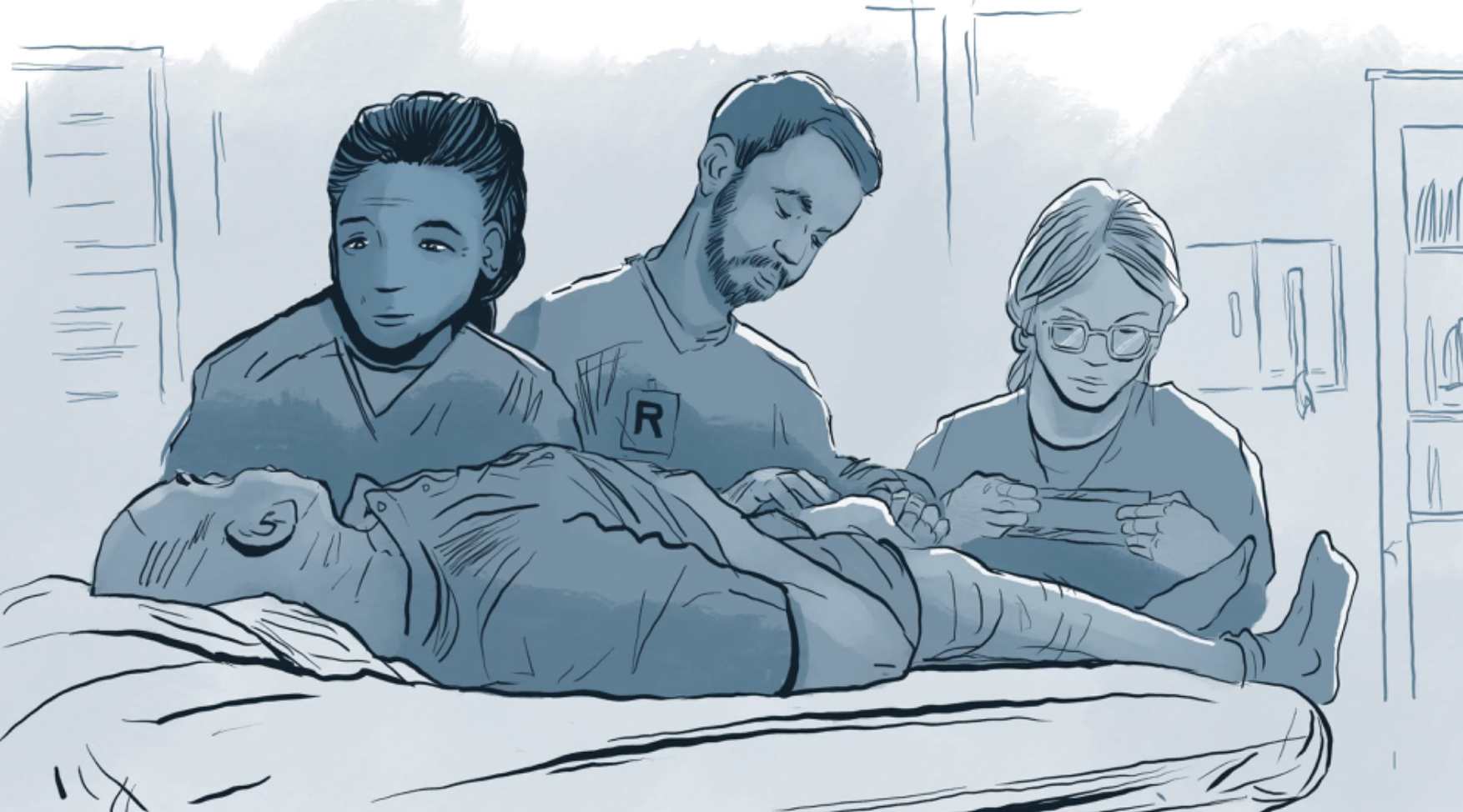
Layered Learning
Layered learning in the medical education context refers to having multiple levels of learners and a clinical preceptor working together at the same time to teach and learn from each other.
While there is no template for how layered learning should look, we’ve spoken to patients, preceptors, residents, students, and administrators to develop the resources below to support its integration into community-based clinical teaching settings.
Explore by clicking here: Layered Learning
Presentation Design, Organization & Engagement for Effective Teaching
This module will help you design and create an organized and accessible presentation that includes appropriate audience engagement, with special consideration given for virtual sessions or presentations.
Explore by clicking here: Presentation Design, Organization & Engagement for Effective Teaching

A Day in the Life of a Preceptor
This is a novel program that has been developed by family physicians, for family physicians. It is structured around how teaching is typically sequenced in a community-based office.
The program covers 5 topics and involves small groups of 4-5 preceptors. Time committment is 3.5 hours every two months – 1hr live virtual session, 1hr online self-study, 1.5 hr social gathering to connect and work through cases.
Recruitment occurs in the Spring and runs over the course of a year.
Additional Resources
Medical Student Duty Hours & Important Dates
This document outlines UBC’s Undergraduate Medical Education Program’s policy on medical students’ clinical duty hours as well as highlights call protected dates, timeline of important events, and other dates students may not be in clinic.
What Clinical Supervisors and Preceptors Need to Know: Expectations for Supporting Students in Clinical Settings
Policy 031B outlines key responsibilities of clinical supervisors. The clinical environment should support students to achieve the goals of their educational program, rather than fulfilling service requirements. Matching medical students with clinical responsibilities at their level and gradually increasing responsibilities under your guidance is key to progressing educational goals while ensuring patient safety.
Download What Clinical Supervisors and Preceptors Need to Know (Policy 31B)
Attendance Policy and Absence Procedure
Policy 006 aims to promote students’ autonomy in managing their absences while being mindful of their professional and clinical responsibilities as UBC medical students. It identifies expectations for attendance and the process for reporting absences. It also identifies the consequences of unreported absences and the potential impact on advancement through the program when a student is absent.
Download Attendance Policy and Absence Procedure (Policy 006)
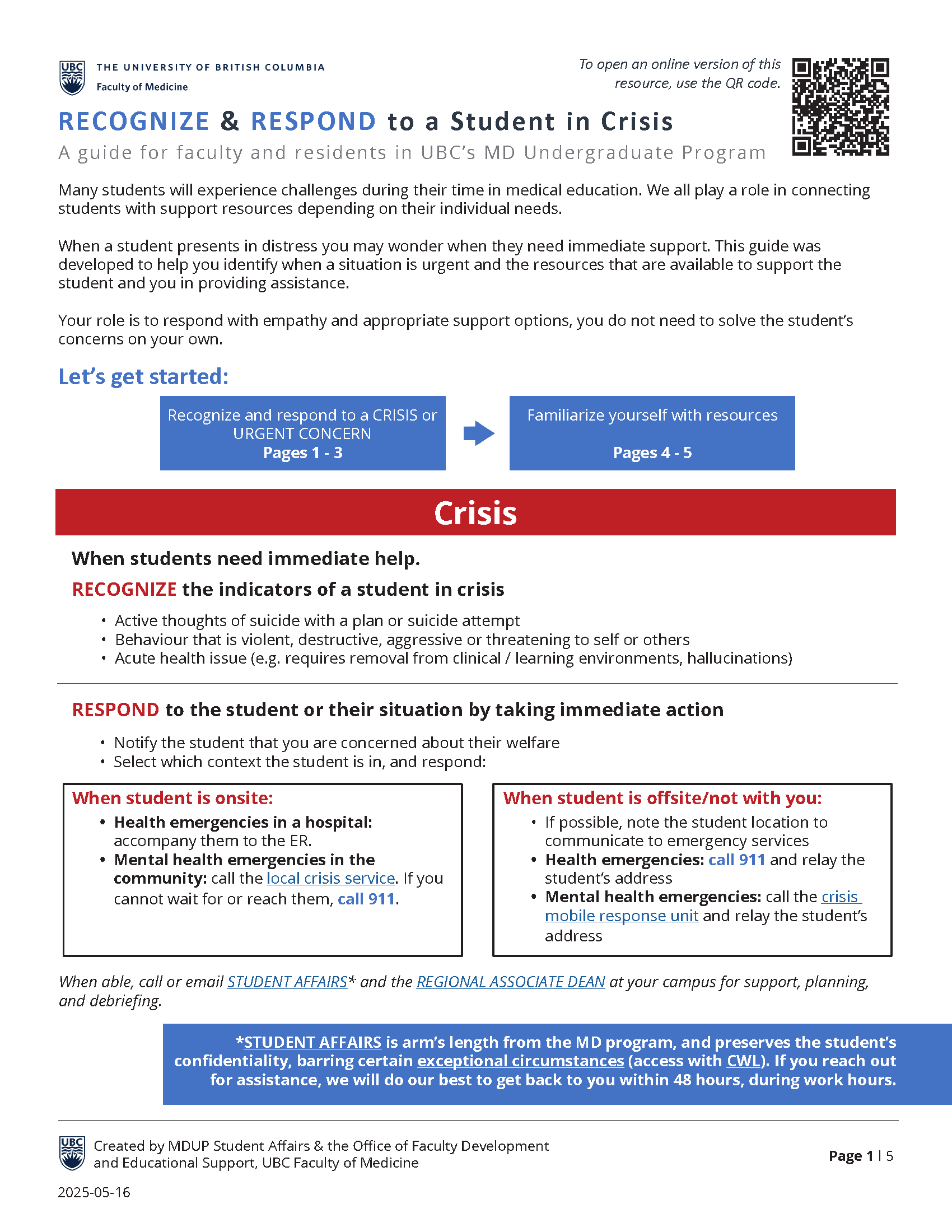
Recognize and Respond to a Student in Crisis
Created by MDUP Student Affairs and the Office of Faculty Development, this resource helps you identify and differentiate the severity of a student’s distress and enables you to guide them to the most appropriate resources and supports.
Do you have questions? Is there a topic that is relevant to teaching in the ICC that you’d like to see covered?
Please contact Drs. Maggie Watt or Natasha DeSousa by reaching out to karen.groden@ubc.ca
Fore more information on ICCs at UBC visit the following link: MD Program ICCs
